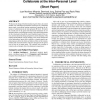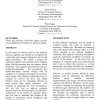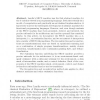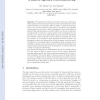20 search results - page 4 / 4 » An architectural view of game theoretic control |
128
click to vote
NETWORK
2007
15 years 1 months ago
2007
One of the promising applications of IEEE 802.16 (WiMAX)-based wireless mesh/relay networks is to provide infrastructure/backhaul support for IEEE 802.11based mobile hotspots. In ...
117
click to vote
ATAL
2008
Springer
15 years 3 months ago
2008
Springer
We discuss the design of the Intermediary Agent's brain, the control module of an embodied conversational virtual peer in a simulation game aimed at providing learning experi...
123
Voted
GAMEON
2000
15 years 3 months ago
2000
In this paper we discuss some of the relations between cognition and emotion as exemplified by a particular type of agent architecture, the CogAff agent architecture. We outline a...
117
click to vote
IFL
2004
Springer
15 years 7 months ago
2004
Springer
Landin’s SECD machine was the first abstract machine for the λ-calculus viewed as a programming language. Both theoretically as a model of computation and practically as an ide...
130
click to vote
DIS
2009
Springer
15 years 8 months ago
2009
Springer
We analyze the dynamics of problem-solving in a framework which captures two key features of that activity. The first feature is that problem-solving is a social game where a numb...




